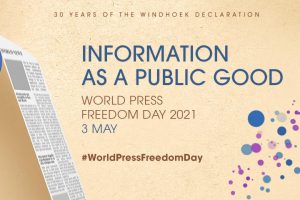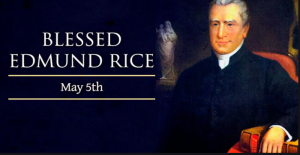3 May – World Press Freedom Day
 This year’s World Press Freedom Day theme “Information as a Public Good” serves as a call to affirm the importance of cherishing information as a public good, and exploring what can be done in the production, distribution and reception of content to strengthen journalism, and to advance transparency and empowerment while leaving no one behind. The theme is of urgent relevance to all countries across the world. It recognizes the changing communications system that is impacting on our health, our human rights, democracies and sustainable development. To underline the importance of information within our online media environment, World Press Freedom Day 2021 will highlight three key topics:
This year’s World Press Freedom Day theme “Information as a Public Good” serves as a call to affirm the importance of cherishing information as a public good, and exploring what can be done in the production, distribution and reception of content to strengthen journalism, and to advance transparency and empowerment while leaving no one behind. The theme is of urgent relevance to all countries across the world. It recognizes the changing communications system that is impacting on our health, our human rights, democracies and sustainable development. To underline the importance of information within our online media environment, World Press Freedom Day 2021 will highlight three key topics:
- Steps to ensure the economic viability of news media;
- Mechanisms for ensuring transparency of Internet companies;
- Enhanced Media and Information Literacy (MIL) capacities that enable people to recognize and value, as well as defend and demand, journalism as a vital part of information as a public good.
https://www.un.org/en/observances/press-freedom-day
5 May – Feast of Blessed Edmund Rice

In 1808, Edmund Rice, following the example of Venerable Nano Nagle’s Presentation Sisters, founded the Presentations Brothers, an order of men dedicated to education, and the first order of men to be founded in Ireland. The rule of the community was approved in 1821 by the Pope, and the name was changed to the Christian Brothers. By 1825, Edmund and his 30 Christian Brothers were providing free education, clothing, and food to about 5,500 boys in 12 different towns. Edmund served as the superior general of the community from its inception until 1838, when he retired at the age of 76. He died in 1844, and was beatified in 1996 by Pope John Paul II, who called him “an outstanding model of a true lay apostle.” His official Feast Day is celebrated on 5 May each year.
15 May – International Day of Families
 This year’s 25th anniversary of Copenhagen Declaration and Beijing Platform for Action comes at a time of one of the most challenging global health and social crises. The 2020 COVID-19 pandemic brings into sharp focus the importance of investing in social policies protecting the most vulnerable individuals and families. It is the families who bear the brunt of the crisis, sheltering their members from harm, caring for out-of-school children and, at the same time, continuing their work responsibilities. Families have become the hub of intergenerational interactions that support us in this crisis. Under economic duress poverty deepens. In times of uncertainty stress increases – often resulting in growing violence against women and children. That is why the support for vulnerable families – those who have lost their income, those in inadequate housing, those with young children, older persons and persons with disabilities – is imperative now more than ever.
This year’s 25th anniversary of Copenhagen Declaration and Beijing Platform for Action comes at a time of one of the most challenging global health and social crises. The 2020 COVID-19 pandemic brings into sharp focus the importance of investing in social policies protecting the most vulnerable individuals and families. It is the families who bear the brunt of the crisis, sheltering their members from harm, caring for out-of-school children and, at the same time, continuing their work responsibilities. Families have become the hub of intergenerational interactions that support us in this crisis. Under economic duress poverty deepens. In times of uncertainty stress increases – often resulting in growing violence against women and children. That is why the support for vulnerable families – those who have lost their income, those in inadequate housing, those with young children, older persons and persons with disabilities – is imperative now more than ever.
https://www.un.org/en/observances/international-day-of-families
21 May – World Day for Cultural Diversity for Dialogue and Development
 Cultural events cancelled, cultural institutions closed, community cultural practices suspended, empty UNESCO World Heritage sites, heightened risk of looting of cultural sites and poaching at natural sites, artists unable to make ends meet and the cultural tourism sector greatly affected… The impact of COVID-19 on the cultural sector is being felt around the world. This impact is social, economic and political – it affects the fundamental right of access to culture, the social rights of artists and creative professionals, and the protection of a diversity of cultural expressions. The unfolding crisis risks deepening inequalities and rendering communities vulnerable. In addition, the creative and cultural industries (CCI) contribute US$2,250bn to the global economy (3% of GDP) and account for 29.5 million jobs worldwide. The economic fall-out of not addressing the cultural sector – and all auxiliary services, particularly in the tourism sector – could also be disastrous.
Cultural events cancelled, cultural institutions closed, community cultural practices suspended, empty UNESCO World Heritage sites, heightened risk of looting of cultural sites and poaching at natural sites, artists unable to make ends meet and the cultural tourism sector greatly affected… The impact of COVID-19 on the cultural sector is being felt around the world. This impact is social, economic and political – it affects the fundamental right of access to culture, the social rights of artists and creative professionals, and the protection of a diversity of cultural expressions. The unfolding crisis risks deepening inequalities and rendering communities vulnerable. In addition, the creative and cultural industries (CCI) contribute US$2,250bn to the global economy (3% of GDP) and account for 29.5 million jobs worldwide. The economic fall-out of not addressing the cultural sector – and all auxiliary services, particularly in the tourism sector – could also be disastrous.
https://www.un.org/en/observances/cultural-diversity-day



